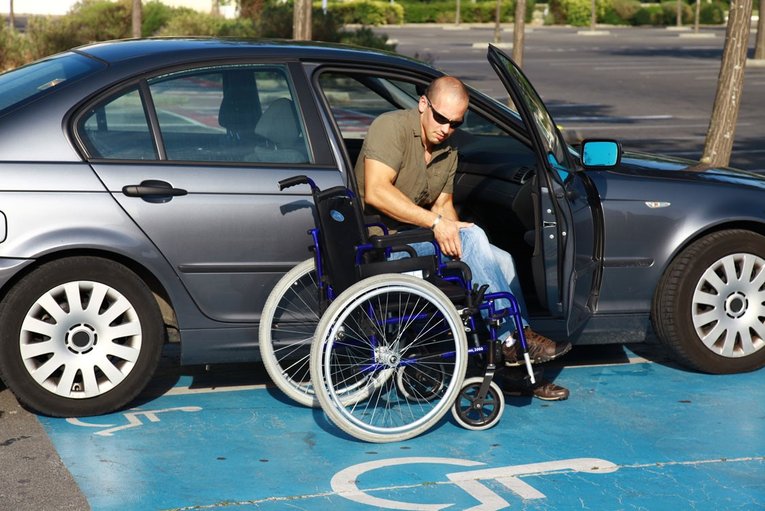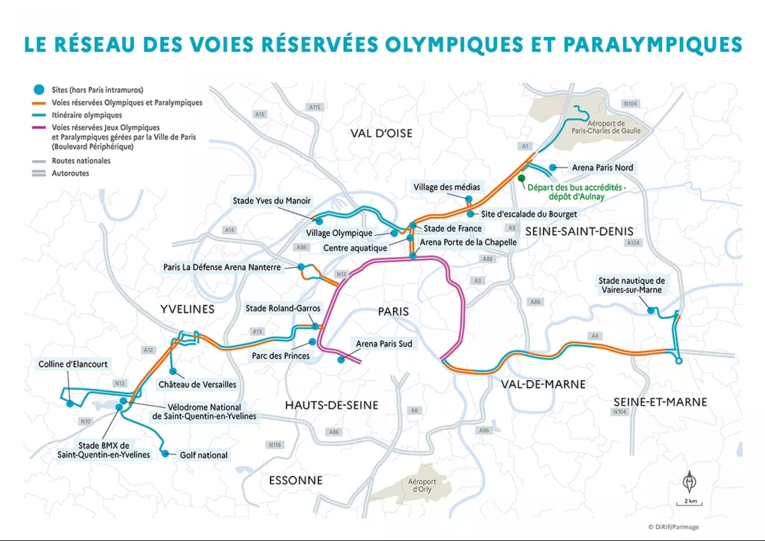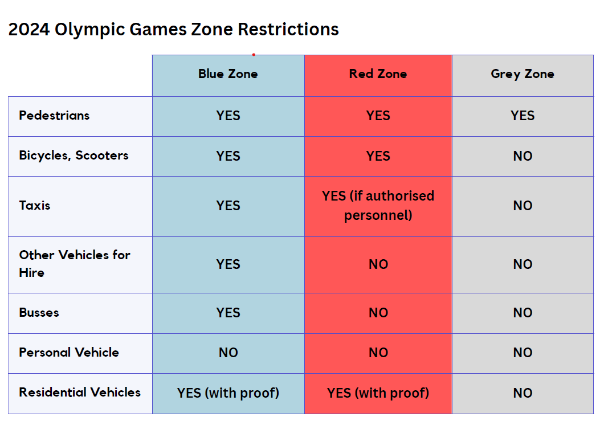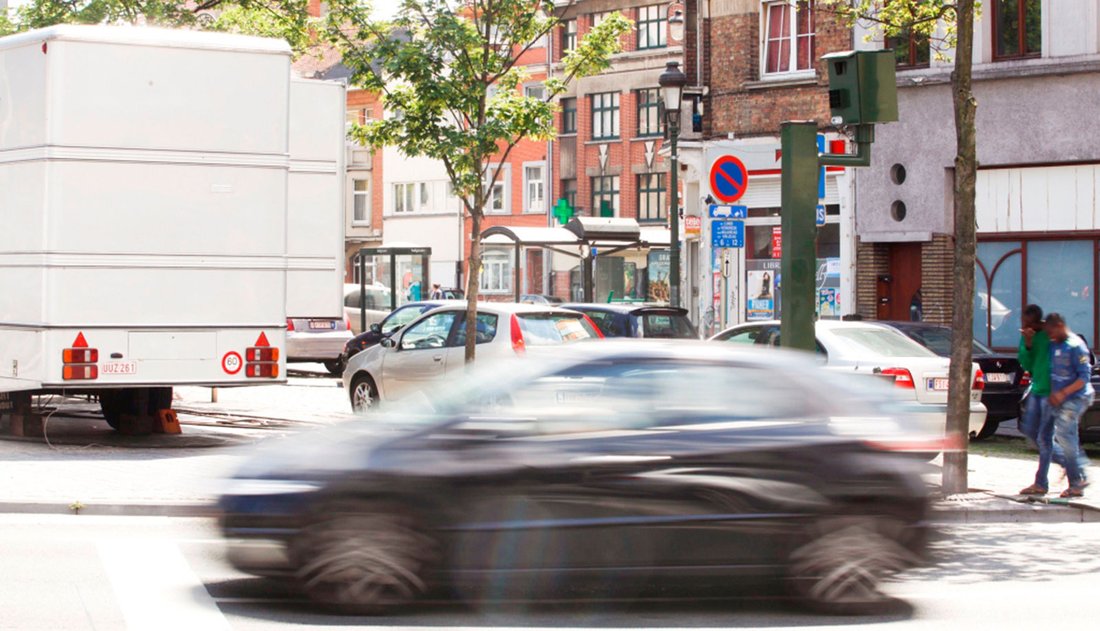Travelling by car
If you are travelling by car to France for the 2024 Paralympic Games, find out what you need to know to avoid any problems on the road.
Driving restrictions in Paris
From 29 August until 8 September 2024, you will need an authorisation to drive around the security perimeters of the Games. They are located around the areas where the opening ceremony and the sport sessions take place. If you want to access these zones by car, you need to register online at Pass Jeux – Official Website (pass-jeux.gouv.fr). Be aware that car access around these areas will be granted only to certain categories of people who have a “legitimate reason”, such as access to their home/work, moving, medical appointment, etc.
If you come to France with a car, we strongly recommend informing yourself about basic traffic rules, radar traffic detectors, the points system for traffic offences, petrol, safety measures, etc. You will find an overview of these rules in our article Driving in France.
All the information on renting a car in France in our article “Rent a car during the 2024 Olympic and Paralympic Games“.
You can find petrol stations at most supermarkets in France, or on the highway, which is more expensive. Credit cards are typically accepted. Generally, you can pay at a booth, or by inserting your card into the machine near the pumps.
Gas equivalence in France:
FR : Sans plomb, 95 ou 98, Gazoile, GPL
EN : Unleaded gazoline, 95 or 98, Diesel fuel, LPG
If you need to recharge your electric vehicle on French roads, you can find electric charging stations on highways, secondary roads and at some holiday locations. More information in tips for getting around with a combustion or electric car (france.fr)
No. Almost all French motorways are subject to tolls. To use a motorway, you will enter through a barrier and get a ticket. Keep this ticket as you will need it to pay and go through the barrier again when leaving the motorway. Make sure you have cash or a credit card when driving on a motorway.
Vehicles are categorised according to 5 categories with their own toll rates. For example, category 1 cars (which refers to light vehicles under 2m) pay a standard fee of 16 euros on the A1 motorway. You can verify which category your vehicle belongs to at Vehicle classification on french motorways - ASFA (autoroutes.fr).
Only some routes are toll-free, such as motorways in Alsace, Lorraine, Brittany or the bypass of Paris for instance. You can recognise the toll-subjected motorways with the word “péage” indicated on the road signs.
Even if most motorways in France have barrier tolls, a new system of free-flow motorways is currently under development. On such motorways, there are no barriers and you receive a notice of payment at home afterwards.
Yes. If you commit an offence in France, you are subject to the French traffic rules and to the French penalties. France practices cross-border information with 19 EU countries. This exchange allows you to be identified and to receive the ticket directly at home.
Some examples of road traffic offences in France include: speeding, failure to wear a seat belt, crossing a red light, drunk driving or phoning while driving.
If you have received a fine, you can pay it online or contest it via the French government website. Find out all the information about road traffic offences in France in our article.
If you come to France with a vehicle registered in your home country, your car insurance may cover you in France for compulsory third-party liability. Check the conditions of your insurance.
Keep in mind that you must show a certificate of insurance proving that your insurance covers you abroad. More information in our article Car accident in Europe.

Yes, some cities in France have implemented local traffic restrictions for environmental purpose. There are 15 towns and cities where you need the so-called “Crit’Air sticker” on your car. The sticker is sometimes compulsory in defined areas or during pollution peaks.
You must order the Crit’Air sticker online at Home page | Official website for the Crit'Air sticker (certificat-air.gouv.fr)
For more information: Crit'Air sticker or pellet (air quality certificate) | Service-Public.fr
In Paris for example, Crit’Air is compulsory and only cars with the following Crit’Air stickers may enter the city:

If you live in the EU and have a European parking card for disabled, it should work in France as well. The EU parking card gives you access to certain parking rights and facilities while travelling to France.
Check for the parking places marked with a wheelchair symbol. You can find them on roads and in car parks. In Paris, vehicles displaying the parking card may park on roads free of charge.
If you are living in France, be aware that France has replaced the EU card by a Mobility inclusion card (Carte Mobilité Inclusion). However your old card should remain valid until the expiration date if prior to end 2026.
More information: European parking card for disabled war veterans | Service-Public.fr
Make sure that you display your parking card at the front of the vehicle and that it is clearly visible.
You can find more information on EU parking card for people with disabilities - France - Your Europe (europa.eu)
Good to know: the European Commission has proposed to establish an improved European Parking Card to ensure the same parking rights across the EU. However, this new card won’t be available yet during the Olympic and Paralympic Games.
During the period of the Olympics, street parking will still be available, with tariffs based on the length of stay and arrondissement that you park in.
If you're staying in a hotel in Paris, check if they have parking options of their own. Sometimes these are more affordable and convenient than street parking.
Certain car park companies allow you to reserve a spot in their car parking ahead of time. With an anticipated 15 million visitors, reserving ahead of time may be the most reliable option.
Make sure, however, that these parking lots are not within security perimeters by checking the online maps provided by the Parisian police.
Yes. While an increase in parking fees for SUVs will come into effect on the 1st of September, standard parking fees will apply to SUV vehicles during the period of the 2024 Olympic Games. As a non-resident, you will pay 6 euros per hour for the first two hours in Paris central districts, and 4 euros per hour in outer districts. Beware as the hourly rates increase with each hour. A six-hour stay in Paris with an SUV will cost 75 euros in a central district, for example.
If you plan on attending the Paralympics from the 28th of August to the 8th of September, the new rates will apply to tourists. Vehicles over 1.6 tonnes will pay 18 euros per hour for the first two hours in a central district, and 12 euros per hour elsewhere. If you have an electric SUV, these parking fees apply only if the vehicle weighs over 2 tonnes.

No, certain Parisian and Île-de-France roads are designated as special “Olympic routes” between the 22nd of August and the 11th of September. Only people accredited by the International Olympic Committee (IOC) can use these routes. Five motorways are affected by these "Olympic Routes". They are indicated by ‘Paris 2024’ stamped road markings and a road sign featuring the Olympic and Paralympic Games symbol.
Examples include the Paris ring road, from Porte de Vanves to Porte de Bercy, passing through the north. The Olympic routes also affect the A12, A13 and RN13 from 27 August (until 8 September), and the A4 from 30 August (also until 8 September).
The complete list of affected roadways is available (French only).
Additionally, you can see which routes are blocked on a given day by clicking « routes » on this interactive map.
Be careful! If you drive on these roads without an accreditation, you are liable to a fine of €135. The police will carry checks, as well as speed cameras that can read your number plate.

Inside these perimeters, access will be limited or controlled for all motor vehicles, starting from 18 July 2024.
There are 3 levels of security:
- Blue Zones: Regulated motorised access (with justification of transit)
- Red zones: All circulation banned (except with special permissions)
- Grey zones: Security perimeter and competition sites. Only pedestrian access.
Some roads will become “Olympic roads”, reserved only for Olympics accredited personnel.
The security perimeters set up for the Olympic and Paralympic Games will change regularly between 15 July and 8 September 2024. To see the different zones at different times, you can check the interactive map of traffic restrictions.
Funded by the European Union. Views and opinions expressed are however those of the author(s) only and do not necessarily reflect those of the European Union or the European Innovation Council and Small and Medium-sized Enterprises Executive Agency (EISMEA). Neither the European Union nor the granting authority can be held responsible for them.


